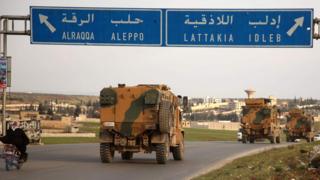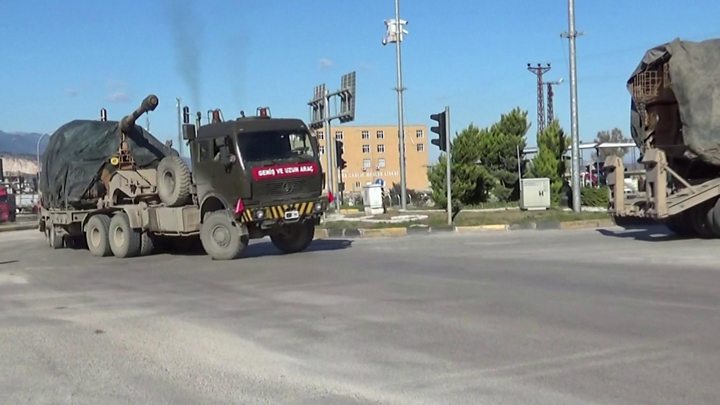 Image copyright AFP
Image copyright AFP Turkey will not let Syria’s government gain more ground in the opposition stronghold of Idlib province, Turkish President Recep Tayyip Erdogan says.
Mr Erdogan told reporters that Russian-backed pro-government forces were “driving innocent and grieving people in Idlib towards our borders”.
More than half a million civilians have fled their homes since the government launched an offensive in December.
Mr Erdogan’s warning came after eight Turkish military personnel were killed.
Turkey’s defence ministry said seven soldiers and one civilian died in Idlib on Monday when they were shelled by the Syrian army despite being told of their position. In response, Turkish forces “neutralised” 76 Syrian soldiers, it added.
Syrian state media said there were no casualties. But the Syrian Observatory for Human Rights, a UK-based monitoring group, reported that at least 13 soldiers were killed by Turkish fire in Idlib and neighbouring Latakia and Hama provinces.
The Turkish military has deployed troops to Idlib to monitor a 2017 de-escalation agreement brokered by Turkey and Russia that has been repeatedly violated.
It was hoped the agreement would avert a government assault that the UN said threatened to create the worst humanitarian catastrophe of the 21st Century.
“Syria is right now trying to buy time by driving those innocent and grieving people in Idlib toward our borders,” Mr Erdogan was quoted as saying by Turkish media. “We will not allow Syria the opportunity to gain ground there.”
The president also said Turkey and Russia – who back opposing sides in Syria’s nine-year civil war – should seek to resolve their differences.

Media playback is unsupported on your device
“There is no need for us to be engaged in a conflict or a serious contradiction with Russia at this stage.”
“We will of course sit down and discuss everything. Not with anger, though. Because those who sit down with anger, get up with losses,” he added.
On Friday, Mr Erdogan threatened to use military force if the situation in Idlib was “not returned to normal quickly”.
Turkey is already hosting 3.6m Syrian refugees and says it would not be able to handle a fresh influx of displaced people.
A Turkish security official told Reuters news agency that there were intermittent clashes between Turkish and Syrian troops on Tuesday around the major town of Saraqeb, which straddles the intersection of the M4 and M5 highways.
The Syrian Observatory for Human Rights said pro-government forces were advancing in the eastern Saraqeb countryside, capturing several villages. Government and Russian warplanes were also carrying out intense air strikes in the surrounding area, it added.
The government and Russia have insisted that they are targeting jihadist militants, but activists have said civilians and civilian infrastructure are being attacked.
The UN human rights office has verified the deaths of at least 83 civilians between 20 and 30 January alone, while more than 1,500 deaths have been recorded in the past nine months.
UN humanitarian officials warned on Tuesday that 520,000 of the 3m people living in Idlib, the vast majority of them women and children, had fled their homes since 1 December.
An additional 280,000 people living in urban centres on the M4/M5 highway axis were at imminent risk of displacement if military operations continued, they said.
“Many of the displaced have left with nothing but the clothes on their back or what they could pile onto ramshackle vehicles,” Jens Laerke, a spokesman for the UN Office for the Co-ordination of Humanitarian Affairs, told reporters in Geneva.
“They urgently need shelter, food, water and sanitation support, health support, emergency education and not least protection.”
It has compounded an already dire humanitarian situation on the ground caused by the displacement of more than 400,000 other people between April and August.
Click Here to Visit Orignal Source of Article https://www.bbc.co.uk/news/world-middle-east-51371462

